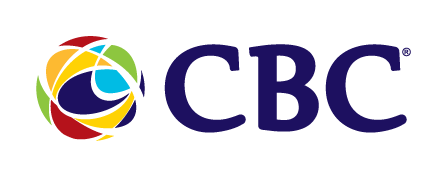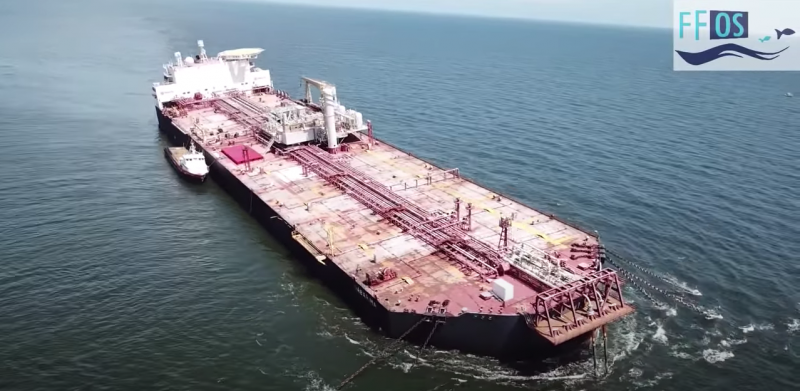
The FSO (Floating Storage and Offloading Unit) Nabarima, the vessel in danger of sinking and creating a huge oil spill in the Gulf of Paria. Screenshot taken from a video uploaded to YouTube by Fishermen and Friends of the Sea (FFOS), the Trinidad and Tobago-based nongovernmental organisation that raised the alarm about the situation.
This article was originally published on Cari-Bois News. An edited and updated version is republished here as part of a content-sharing agreement with Global Voices.
A three-person team sent by the Trinidad and Tobago government to inspect the Venezuelan-owned FSO Nabarima, a floating storage and offloading unit containing approximately 1.3 million barrels of crude oil that was leaning to one side in the Gulf of Paria, has determined the vessel to be in stable condition, with no tilt, list, or water ingress, and therefore at “minimal risk” of an oil spill.
However, Franklin Khan, the twin-island nation’s energy minister, conceded at a press conference on October 22, that the team — which spent approximately three-and-a-half hours on board the vessel — was not allowed to undertake an in-depth technical assessment:
We weren’t allowed to go with instruments as though we are regulators in the industry. We were making a trip that was coordinated by Ministry of Foreign Affairs. It was an international trip from one government to another and we were allowed to observe and take notes to ascertain the veracity of what they have been telling us.
After a guided tour of the FSO Nabarima, the team reported that rooms for the engine, generator, boiler, machine control, tank control as well as the main deck, pumps, bilge and other critical areas within the vessel “seemed to have been fine.”
The tanker, which is currently undergoing maintenance work, has been operating in the Gulf of Paria, located between Trinidad and Venezuela’s east coast, for a decade, storing oil procured from the Corocoro Field through a joint venture between Venezuela’s state-owned oil company, Petróleos de Venezuela (PVDSA) and the Italian energy multinational Eni.
Speeding up the process
Meanwhile, the Trinidad and Tobago government is recommending that Venezuela find a way to speed up the process of evacuating the crude oil aboard the tanker in order to reduce the likelihood of a spill, which environmentalists say would be disastrous for both marine ecosystems and livelihoods.
The transfer of the crude oil, which is currently underway, could take up to 35 days to complete, as it entails pumping the 1.3 million barrels’ worth of oil from the FSO Nabarima to a barge that will have to make several trips since it can only carry 30,000 barrels at a time. The barge then transfers the oil to another tanker, the Icaro, which has a loading capacity of 300,000 barrels.
“The extended period for the offload in itself poses a slight risk, although the operation is deemed to be safe,” Khan explained. Had a larger vessel been handling the ship-to-ship transfer, he surmised, the operation could have been complete in a little as two days.
‘Unwanted events’
Concerns about the integrity of the vessel came to public attention when the Trinidad and Tobago-based nongovernmental organisation, Fishermen and Friends of the Sea (FFOS), alerted the Ministry of Energy and Energy Industries (MEEI) via correspondence on August 24 (and the general public via social media posts) of the presence of the tanker “located within Venezuelan waters, with a total capacity of 1.3 million barrels which was allegedly tilted and at risk of capsizing.”
Refuting accusations about the Venezuelan government’s lack of transparency in the matter, Khan said that the official communications from Venezuelan President Nicolás Maduro’s administration were forthright about two “unwanted events” that occurred in early September.
The first was the “loss of stability with a negative trim of 3.5 meters,” which caused the eight-degree tilt of the vessel seen in photographs shared on social media, and “a seven-degree list to the starboard side due to failure of the ballast system.”
The second “unwanted event” was water entering the bilge in the fourth deck of the engine room, due to valve failure associated with the bottom suction and emergency bilge draining system. The flooding of the engine room then led to the failure of “a number of electrical details.” Khan said both these issues have since been rectified.
The role of US sanctions
Contributing to the precarious situation are the sanctions that American President Donald Trump imposed on Venezuela in 2019, which made it difficult for Venezuela to sell the crude stored onboard the ship.
According to former US National Security Adviser John Bolton, the move was designed to force countries and companies to choose between doing business with the United States or Venezuela, with the understanding that new sanctions could be imposed on anyone who supported the Maduro administration.
Minister Khan was careful to state that Venezuela and Trinidad and Tobago enjoy a “friendly relationship,” and reminded nationals that when the now-defunct Petroleum Company of Trinidad and Tobago Limited (Petrotrin) suffered a major oil spill in 2016, Venezuela — which was severely affected because of its close proximity — offered to assist in clean-up operations pro bono.
Although a treaty on the delimitation of marine and submarine areas exists between the two countries and states that an oil spill contingency plan can be invoked by either party if they perceive a viable threat to the environment, Minister Khan said that Trinidad and Tobago currently “had no technical basis” to invoke the plan.
Response guided by ‘diplomatic action’
Minister of Foreign and CARICOM Affairs Amery Browne, who also attended the press conference, stated that much of what has been done to address the issue has taken place behind the scenes:
A lot of diplomatic activity […] is not done in the full glare of the public and there is often use of more quiet channels to get our objective achieved and to a large extent, the objective has been achieved.
However, while Trinidadian newspaper columnist B.C. Pires acknowledged that the issue of the tanker “is, strictly legally speaking, a Venezuelan problem, and only Venezuela is legally permitted to attempt to solve it”, he added that if the oil spills, “we will find out there is no such thing as ‘Venezuelan’ waters in an ocean, only strict Venezuelan legal responsibility for an ecological disaster far worse than a century of hurricane seasons added together.”
Fishermen and Friends of the Sea, meanwhile, put out a statement that thanked the government for its efforts thus far but made it clear that it felt the bilateral agreement between the two countries had failed and that there was still high-level risk involved. It also requested video evidence that the vessel was “stable,” since it claims “misleading and doctored pictures have in the past spread propaganda.”
Video footage of the visit subsequently provided by the Venezuelan government shows an upright vessel, although the report from Trinidad and Tobago’s TV6 news appears to have mixed in shots taken from the video provided by FFOS.








